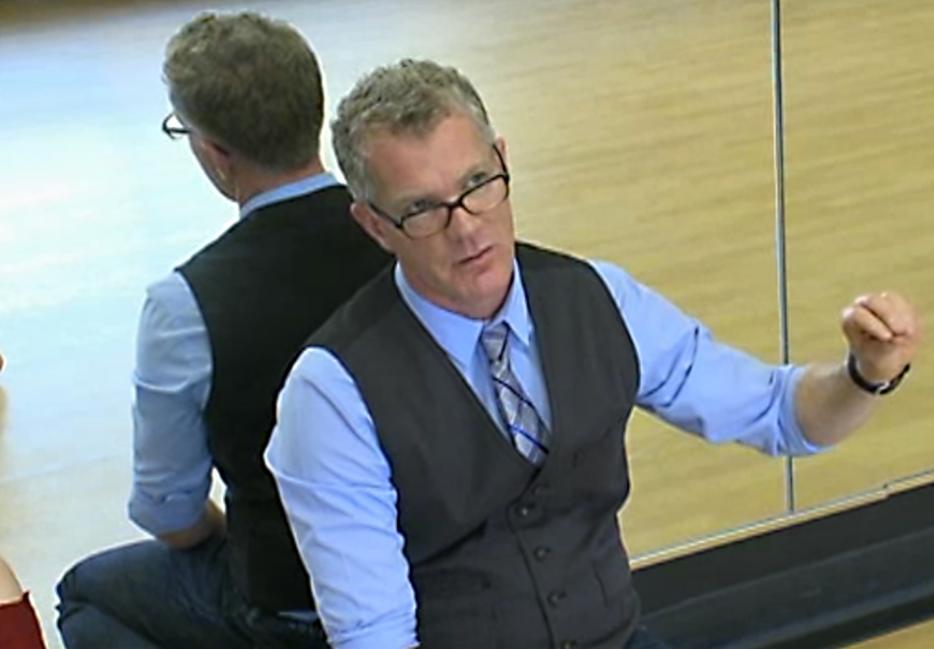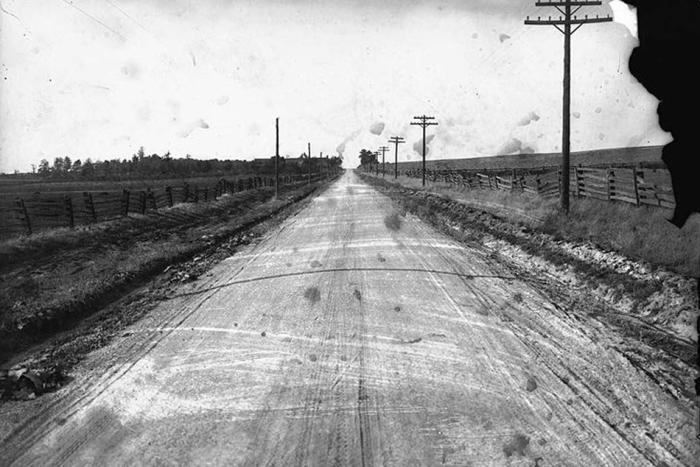One of the happiest moments of my life was when I learned I’d gotten into arts high school for music theatre, but even then I wasn’t quite sure how I’d gotten in. I can’t dance, I can barely act, and my voice is mediocre at best. Sure enough, within a year it was abundantly clear, to both me and my teachers, that my acceptance had been a mistake. I hated the program and resented most of my classmates. My dreams turned to playing in a lo-fi band.
Singing is just one of many things I’ve wanted badly to be good at but haven’t been, including:
- Sports. In elementary school I tried out for every single team I qualified for and might have squeaked onto the basketball team had I not punched a friend in the head for not passing me the ball during scrimmage.
- Comedy. In junior high I obsessed over the Kids in the Hall and kept a “Comedy Book” in which I wrote not much, including a poem about a chicken, and a sketch where a guy orders large fries and instead gets one large fry. One page says, “I have an idea for a sketch, but its too contreversial [sic] to write here,” while another reads, simply, “A Fat MAN.”
- Songwriting. I spent most of high school writing songs on my dad’s four-track but only ever performed them at a sparsely attended showcase for a friend’s cassette tape label, which specialized in “music that was never meant to be heard.” Summer after graduation I wrote an acoustic, whisper-sung song to a guy I was dating that I thought sounded like Smog, but when I played it for my best friend she burst into hysterical laughter. I put the guitar down and haven’t picked it up much since.
This is not to feel sorry for myself, just to say that I know the feeling of throwing yourself with all your heart against a brick wall.
*
Of all the instructors I had in music theatre, Paul Aikins left the biggest impression on me. Not because he saw my hidden talents as a performer—he didn’t—but because he was blunt, and a bit of a character. He knew I didn’t want to be there, I knew he knew I didn’t want to be there, and neither of us pretended otherwise. He was more direct than other teachers and our antagonism felt sort of like a bond.
Being a teenager, I didn’t really think of him as a human with feelings and dreams, nor an adult and a mentor with wisdom to impart; I figured there was nothing relevant to be learned in music theatre anyway. To me he always seemed more like a sparring partner. So it surprised me when,during vocal class one day, Paul sat us all down and played what seemed to me like a flakey New Age meditation tape. I was poised to raise my hand and be a smartass when he began to speak with arresting earnestness about how tapes like this had changed his life: as a professional actor, he said, they’d taught him that his calling was to teach. I don’t remember exactly how I felt at the time, but I know that this display of humanity made me uncomfortable. It seemed to me like he was admitting to a dream he’d given up, and back then, anything to do with dream forfeiture gave me flu aches.
I know now that if you can do what you love for a living, you’re very lucky, and that Paul is very lucky: he did what he loves for a living and was, at the time, adapting to a different version of what he loves for a more substantial living. But I was eons away from understanding the first thing about striving and compromise, and still dreaming emphatically about things I never had the talent for to begin with.
Eventually I found something I was good enough at. I never was a performer, but I remain a very enthusiastic karaoke hobbyist, and I think sometimes about Paul’s speech and find it very moving. So I sent him a Facebook message asking if we could talk.
*
Paul has been teaching at the Etobicoke School of the Arts for almost 15 years. Today he’s head of the music theatre department (he also runs a master class series), and has been recognized outside of education circles as well: CBC’s The National profiled him, and Unsung: Behind the Glee, a documentary featuring the show choir he directs (SPLASH: two-time national champions!) will be airing on TVO starting December 4. This comes across in his demeanour: he looks the same, but exudes a level of respectability that caught me off guard. We sat in the music office, the same room where he’d played that tape, and I found him just as blunt but doubly charismatic.
One of my most salient memories of your class was sitting on the floor listening to a meditation tape, like, “Visualize your stress as a purple ball getting smaller and smaller!” And you know I was just a brat, kind of—
Rebel. You were kind of rebellious.
So in my head I was kind of scoffing at this New Age-y—
“This is sooooo stupid.”
But then you gave this very heartfelt speech about how when you were working as an actor, you were listening to these tapes, and they helped you realize that your calling was to be a teacher. So... first of all, am I remembering that right?
You are. I’m surprised that I did that back then. That seems to be more what I do now. But yeah, that’s exactly what happened with me when I was struggling as an actor and trying to deal with, Am I passionate enough about this? Am I going to make it? Is there enough work? ‘Cause there wasn’t enough work. I didn’t want to keep waiting tables or catering. And I kept hearing my mom’s voice in the back of my head saying, Well, you can always get into teaching.
But then when I was in Paris studying at an acting school, and dating somebody who lived there, I started to coach him on how to sing with a better English accent. He started to spread the word around, so I started coaching more people, and that’s when I started to realize: Oh, this is what passion is. So that started me switching gears. Because it was a tough thing to leave, right? All my friends were in that business. My whole world was in the performance industry.
*
Paul worked for 12 years as an actor, in music theatre and sometimes film and television. His most lucrative gig was on a cruise ship, which paid him in US cash each week. Even after his Paris epiphany, it took him a while to commit to the change; always another gig would beckon, until finally he met somebody who flat-out refused to date an actor. Paul, by then in his 30s, went back to teacher’s college. They’re still together.
While I didn’t know it at the time, Paul had started at ESA just a year before I did, and was wrestling with some of the same insecurities as the rest of us. He wondered if he was good enough to be teaching there, and whether the kids believed he was good enough to be teaching there, which sounds downright awful because if there’s one thing more intimidating than belting out “The Man that Got Away” for your sassy vocal teacher in an empty room, it’s convincing a room full of teenagers—lots of them gunning for a career in the industry you just left—that you deserve their respect.
How was the cognitive adjustment, and the ego adjustment, going from striving to working with kids who are about to start striving, and sort of grooming them for that?
I’ve evolved a lot. Because when I first started teaching I was very cut and dry. I was like, “You’re never going to make it. So don’t even.”
You would tell kids, “You’re never going to make it”?!
No, I wouldn’t actually tell them that, but back then I probably had way more “favourites.” Quote unquote, because if you go on Ratemyteachers.com, that’s what some of the comments say. My mom always goes on and reminds me what’s been posted. I used to go on all the time and read it, and I would be so depressed, like, Oh my god, if that’s what people think of me... And of course there’d always be tons of posts right after the casting list of something went up.
Do you remember the worst thing you ever got on RateMyTeachers?
I think it’s when they go, “He’s the worst teacher ever, he’s just a wannabe actor that couldn’t do it and so he got into teaching and destroys people’s self esteem.” Stuff like that. And maybe back then I was, I don’t know. But I’m a completely different teacher than I was back then. I think because I was so close to being a performer, I thought, Oh, that’s all I want to focus on with these kids. And if they’re not professional, dismiss them. Whereas now I’m becoming more compassionate, and more empathetic, more about trying to figure out how to get these kids interested in something.
So when did this shift occ—
Like, I would have been probably really dismissive of you back then.
Oh yeah.
Just thinking, this girl, why’s she here? She doesn’t want to be here.
But it’s true, I didn’t want to be there.
Right. But I think if that kid were here now, I would have been able to get you engaged more.
*
In high school I would have told you that I hate music theatre, but it was never the case—I just wasn’t any good at it, and being in music theatre at ESA meant I couldn’t pretend otherwise. Adjusting my cravat in the change room between chorus numbers in Les Miserables, hearing our phenomenally gifted Valjean—now an opera star—sing “Bring Him Home” through the intercom, I wept internally. And yearned. (I felt the same way recently reading Michael Sokolove’s Drama High, about a renowned high school drama teacher in a struggling, blue-collar town. So renowned that he was asked to pilot Les Mis for a high school audience back in 2001. Thank you, Lou Volpe!)
I remember the first show I ever—the only show I ever had a speaking role in here was Les Miserables. I played Fauchelevent, and I said, “Monsieur Le Mayor, I have no words. You are a saint.”
Oh, you remember that!
You coached me very well. On that one line.
Your accent’s pretty good.
“These pretzels are making me thirsty!”
[LAUGHS] That’s funny. I don’t remember that.
Do you remember me at all as a student?
Totally.
How do you remember me as a student?
Dark. Dark clothes. Little bit of dark makeup. Inquisitive. Questioning. If something didn’t seem ethically right, you were the first to call us on it. “Why do we have to do that?”
[LAUGHS] What ethical issues would there have been?!
No, if something didn’t seem fair, you’d always be the first to challenge it. I remember coaching you, I think one year I might have taught you vocal. I thought you had lots of potential as a singer.
Really?!
But you just hadn’t discovered it yet. And I knew you were going to go into writing, because your assignments were always—the assignments that you did do were really well written. Like, you were sooooo not Music theatre!!! [Makes jazz hands]. I think at the time, if I knew more about technical theatre, I would have been like, she’s going to be more like a stage manager. Or if we had a writing program in theatre, I could have seen that.
Well, I want to apologize, because I think I was a real pain in the ass. And I remember we had a bit of an antagonism.
Mmhmm.
In hindsight I really wish I had tried harder.
Well, everybody does. My whole four years, six years at university, I don’t even remember—I used to sit there in my ear training class with my headset on, and I would kind of flirt with the instructor and go, Only ask me number three! ‘Cause you’d have to know all of these keyboard chord progression charts, and I’d be like, I’m only practicing one of them.
Of your students who’ve gone into performance, who are some that you’re really proud of?
Well, the star of Les Mis, Elliot Madore. Remember him?
Of course.
We’ve remained close friends, and I’ve seen him in New York, and he took me to the Met, because he won the Met competition. So I became close friends with his family, on the journey of him becoming a superstar. He’s been really gracious to my family and myself, he sang at my dad’s funeral.
Oh wow.
He’s such a great kid. Great guy. He’s very mature. And Brittany Allen, we’ve forged a great relationship, too.
Would it be better to have a student with no talent who just didn’t give a shit, or a student with no talent who really, really, really cares and wants it more than anything else in the world?
I’d rather teach that student. The latter student.
But doesn’t it break your heart a bit?
To be perfectly honest, I’ve never had a student that’s been talentless—I don’t think they would have gotten into the school if they had zero talent. The ones that probably aren’t going into performance, when it comes time to go to university, most of them have figured that out. But they love it, so they go into other aspects of music. Music education, or early childhood education, or administration of the arts. A lot of those kids, in the senior years, get introduced to technical theatre, and usually they’re the kids that are really well organized, and smart as a whip. I start to use them as leaders, and in administrative kinds of roles, and they realize, Oh, this is another career I could go into. Entertainment lawyers. There’s all kinds of things they could do.
*
Music theatre is way more popular now than it was when I was going to school, and that’s a good thing for humanity. All those embarrassing, parade float-sized emotions build character: musicals maul you with sentiment until you surrender and start to enjoy yourself. You cannot enjoy a show tune from a bitter place, and if you can’t enjoy show tunes, bitterness is probably your lot.
Do you think Glee has changed the culture here?
Oh my god, totally.
Yeah?
It’s changed the culture massively, particularly with young men, because every year we have more and more young men auditioning. It’s made people more aware of music theatre, it’s made people really aware of what show choir is, and that’s my most recent passion—I started to watch great American show choirs more, and think, that’s where I want to go with the choir that I run here, SPLASH. It’s helped make music education OK, not Oh, that’s so gay, like it was when we were young. It’s cool.
Do you think people come in with an idea of how a high school music teacher should be?
Yeah. I just recalled something, I’m looking at you, and as a student in high school I was always like, Alex’s glasses are always so dirty.
[LAUGHS]
And right now I can barely see through them. It’s like, how can she see? Do you want a wipe?
Sure.
[Handing me two wipes] Sometimes it takes two. Mine always take two. The first tends to wipe the grease around. Or whatever, the pollutants. I remember looking at you in class and just thinking, How does that girl see?
Yeah, they were really dirty. I think they were too small for my face.
Have you never worn contacts?
I have, but it’s funny, I finally got around to getting contacts right as I realized that my face was starting to show the signs of age.
[LAUGHS]
So now I want to cover it all up.
Anyway. I mean, all my friends tell me that I’m like Mr. Schue, too. I mean, for me, watching that show, as stupid as it is now, he certainly helped me become more compassionate as a teacher.
Yeah?
Yeah. Because he’s a strong performer, too. And just how could it not, right? Especially when your friends are all, “Oh my god, you’re like Mr. Schue, you’re Mr. Schue!” Well, I guess I should start acting like him if I am.
By the time you got into teaching, would you say you were committed to teaching? Or did you still want to be—
Oh, I still fully wanted to be a performer. And that probably showed in the first five years of my teaching—that’s why I was dismissive of kids that didn’t want to do it. Yeah. That evolved. Quite a bit. I still had the voices in the back of my head, Well, if you’re not good enough, you can go into teaching. It took a long time to let that go.
On The National, you talked about how offensive that phrase is, “Those who can’t do, teach.”
Yeah, it’s pretty offensive to me. I can understand why people say it, because I’ve had teachers who are like that. And I probably was that teacher in the beginning of my career. But again, we evolve. I’ve done a lot of work to evolve. It didn’t just happen. A lot of personal work, a lot of soul searching, and having a lot of great mentors. That’s helped me the most.






